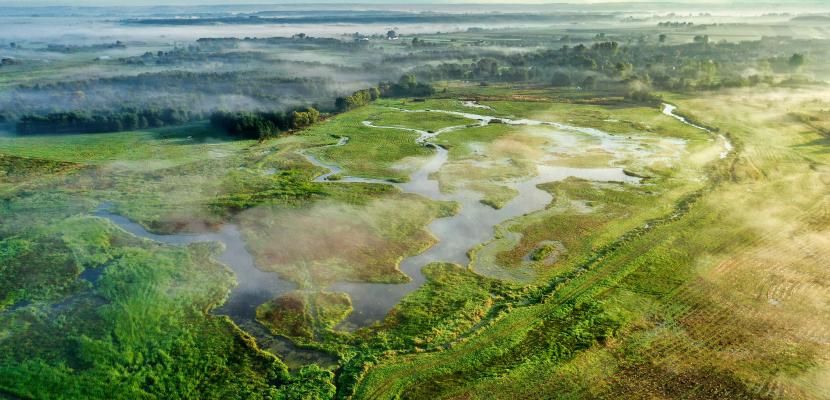
Renaturalization of the inland delta of Nida River – LIFE4Delta_PL

About this good practice
The unique inland delta of Nida River is a geomorphological structure of european importance and one of the richest natural areas in Poland. However, it has been degraded due to past misguided melioration works. The main goal of the project was to renaturalize the water conditions of the area and restore the valuable ecosystem of the river valley and wetland area.
To achieve this goal, the project utilizes best practices and solutions related to the comprehensive protection of priority species, including the implementation of innovative methods for restoring ecosystem funcions, reproduction and reintroduction of endagered local flora and fauna species and the creation of a gene reserve for endangered plants. This includes:
- active protection of riparian forests through the reestablishment of waterflow processes to regenerate degraded habitats (for the first time in Poland);
- reintroduction and active protection of the Unio crassus (thick-shelled river mussel) using innovative methods developed by the Polish Academy of Sciences;
- Development of methods for the active protection and reintroduction of Anisus vorticulus (mud snail), for the first time in Europe!
- Large-scale animal grazing on ca 250 ha in the Nida River valley, aimed at protecing natural habitats.
- Focus on natural processes; The project prioritizes restoring natural hydrological flowss, offering a sustainable and potentially cost-effective approach.
Expert opinion
Resources needed
Overall project budget: 5 473 145 EUR
60% of EU Contribution (LIFE Programme)
30% of National Fund for Environmental Protection and Water Management (PL)
10% of own funds.
Coordinating beneficiary – Swietokrzyskie Voivodeship – The Complex of Swietokrzyskie and Nida River Landscape Parks
Evidence of success
Project maintained ca. 15 km of waterways, created a 3 milion m3 water reservoir and directly reduced CO2 emissions by halting wetland degradation. Furtheromore, unique methods for the renaturalization of the entire degraded area were developed, mostly for the breeding and reintroduction processes of endangered species. Its implementation increased the tourist attractiveness of the entire region. On this basis, new agritourism farms were established, creating jobs for the local community.
Potential for learning or transfer
The LIFE4Delta project`s wetland restoration techniques including flora and fauna reintroduction methodologies hold promises for other regions due to several key factors:
- Specificity and replicability: the project outlines specific actions (oxbows maintenance, wetland ecosystem restoration) that can be adapted to similar wetland ecosystems facing degradation from hydrological disruptions;
- Addressing global challenges: The project tackles issues relevant to many regions: biodiversity loss, climate change mitigation and water resource management;
- Data obtained during the project implementation can be used to address the problem of climate change mitigation. Also it allows proposed methods to be used and replicated on every river in Europe.
Overall, project provides a valuable case study for regions aiming to restore wetlands and address environmental challenges. By carefully considering both transferable aspects and potential challenges, other regions can learn from this initiative
Further information
Website
Good practice owner
You can contact the good practice owner below for more detailed information.
